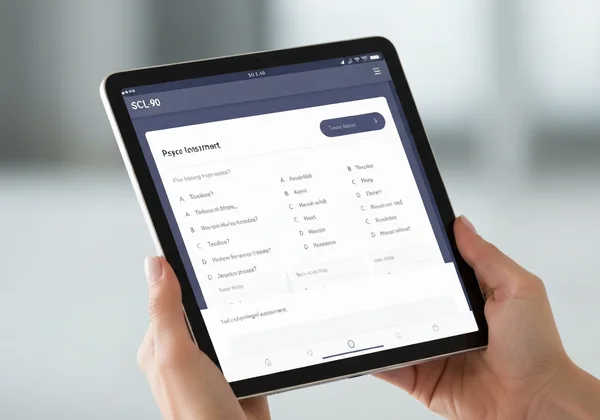Understanding Interpersonal Sensitivity: Your SCL-90 Psychology Test Guide
September 29, 2025 | By Marvin Martinez
Do you ever feel that you are more affected by others' moods than most people? Does criticism sting a little deeper, or do you find yourself constantly worrying about what others think? If you've ever felt a profound sense of unease in social situations or a persistent fear of rejection, you may be experiencing high interpersonal sensitivity. This is a core aspect of our emotional landscape, and understanding it is the first step toward personal growth. How to know if I need a psychology test? Often, the journey begins with curiosity and a desire for self-awareness. This guide will delve into the Interpersonal Sensitivity dimension of the scientifically validated SCL-90 checklist, a key component of this type of psychology test, helping you recognize the signs and offering practical strategies to navigate these complex feelings. Discovering your unique psychological profile can be an empowering first step, and a great way to start is with a free online psychology test.

What is Interpersonal Sensitivity on the SCL-90?
At its core, Interpersonal Sensitivity, as measured by the SCL-90 (Symptom Checklist-90), refers to feelings of personal inadequacy and inferiority, particularly in comparison to others. It involves a heightened self-consciousness and a tendency to feel easily hurt or slighted during social interactions. Individuals with high scores in this area often experience discomfort and a negative expectation of how others will perceive them. It’s not simply being shy; it's a deeper pattern of feeling vulnerable and ill-at-ease in the company of others, which can shape your relationships and daily experiences.
Defining the SCL-90's Interpersonal Sensitivity Scale
The Symptom Checklist-90, a widely respected psychology test, is a self-report psychological health scale used to assess a broad range of psychological symptoms. Within this tool, the Interpersonal Sensitivity scale specifically hones in on a few key experiences. It measures feelings of inadequacy, self-deprecation, and discomfort during interpersonal interactions. Questions on this scale often probe into feelings of being critically judged by others, self-consciousness when speaking or eating in public, and the tendency to take things personally. It essentially quantifies the degree to which your social world feels like a source of potential judgment rather than connection.

Exploring the Psychological Roots of High Sensitivity
High interpersonal sensitivity can stem from a variety of sources, often intertwined. For some, it may be linked to an innate temperament—being born more emotionally responsive and attuned to environmental subtleties. For others, early life experiences play a significant role. Growing up in a critical environment or experiencing social rejection can shape a belief system where one expects judgment from others. These roots contribute to our overall psychological well-being and understanding them can foster greater self-compassion on our journey of self-discovery.
Recognizing the Signs: Social Anxiety Symptoms & Beyond
While interpersonal sensitivity is a specific psychological trait, its manifestations often overlap with what many recognize as social anxiety symptoms. These signs are not just fleeting moments of shyness but persistent patterns that affect your emotional state and behavior. By learning to identify them, you can gain clarity on your experiences and begin to address them constructively. Recognizing these patterns is a key part of the self-awareness journey, which can be further illuminated by taking a SCL-90 assessment.
Emotional Responses: From Unease to Fear of Rejection
The internal world of someone with high interpersonal sensitivity is often turbulent. A common emotional sign is a pervasive feeling of unease or dread before social events. You might spend hours worrying about saying the wrong thing or being perceived as awkward. The fear of rejection is a powerful driver, leading to the over-analysis of conversations, where a neutral comment might be interpreted as a slight. This heightened emotional response can be exhausting, turning potentially joyful interactions into sources of stress and anxiety.
Behavioral Patterns: Avoidance and Over-Apologizing
These intense emotional responses naturally lead to specific behavioral patterns. One of the most common is avoidance. You might turn down invitations, choose to work alone, or avoid speaking up in meetings to minimize the risk of judgment. Another tell-tale sign is over-apologizing. Individuals with high sensitivity often say "I'm sorry" for things that aren't their fault, a behavior rooted in a deep-seated feeling of being a burden or "in the way." This constant self-consciousness can prevent you from forming genuine connections and expressing your true self.

The Impact of Interpersonal Sensitivity on Daily Life
High interpersonal sensitivity is not something that can be switched off at the end of the day; it permeates every aspect of life. From close relationships to professional ambitions, its influence can create significant challenges. Understanding this impact is vital, as it highlights the importance of developing coping strategies for a richer, more fulfilling life. The insights from a comprehensive mental health test can be the first step in mapping out this impact on your personal life. This type of psychology test provides a structured way to understand your patterns.
Navigating Personal Relationships with Increased Sensitivity
In personal relationships, high sensitivity can be a double-edged sword. On one hand, it can make you an incredibly empathetic and caring partner or friend. On the other, it can lead to frequent misunderstandings and emotional distress. You might perceive criticism where none was intended or require constant reassurance from loved ones. This can strain relationships, as partners and friends may struggle to understand the intensity of your reactions. Learning effective emotional regulation is key to fostering healthier, more resilient connections.

Impact on Professional Life and Social Engagement
In the workplace, interpersonal sensitivity can hinder professional growth. The fear of negative feedback can make it difficult to learn and develop, while discomfort in team settings can limit collaboration and leadership opportunities. You might avoid networking events or presentations, missing out on chances to advance your career. This reluctance to participate fully in social engagement can lead to feelings of isolation and unfulfilled potential, reinforcing the underlying belief of inadequacy.
Interpreting Your SCL-90 Interpersonal Sensitivity Score
Taking the step to measure your sensitivity is a proactive move toward self-understanding. When you complete an SCL-90 psychology test, such as the one offered on our platform, you will receive a score for the SCL-90 interpersonal sensitivity dimension. But what does that number actually mean? It’s crucial to approach your results with a mindset of curiosity, not judgment. Your score is not a label but a piece of data to help you connect the dots of your own experience. To get started, you can explore your results on our website.
What a High or Low Score Might Indicate
A high score on the Interpersonal Sensitivity scale typically indicates that you frequently experience the feelings and behaviors discussed above, such as self-consciousness, fear of judgment, and unease in social settings. It suggests that this is a significant area of distress for you. Conversely, a very low score might indicate a high degree of social confidence and resilience to criticism. However, it's important to remember that this is a spectrum. Interpreting results is about understanding where you fall and how that reality shapes your life, not about labeling yourself as "good" or "bad."
When to Consider Seeking Professional Support
An online psychology test is a powerful tool for self-discovery, but it is not a substitute for a professional diagnosis. If your score is high and you find that these feelings are significantly impacting your ability to function in daily life, work, or relationships, it may be time to consider seeking professional support. A therapist or counselor can help you explore the roots of your sensitivity, develop personalized coping strategies, and provide a safe space to work through these challenges. Think of your test result as a guidepost pointing you in the right direction for further growth.
Effective Coping Strategies for Interpersonal Sensitivity
Managing high interpersonal sensitivity is achievable, transforming it from a challenge into a strength. There are numerous effective, science-backed strategies you can use to manage these feelings, build resilience, and foster healthier interactions. It’s a journey of building new skills and thought patterns, one step at a time. The goal is not to eliminate sensitivity but to learn how to work with it, turning a source of pain into a source of strength. You can begin this journey to self-discovery today.
Building Self-Awareness and Self-Compassion
The foundation of change is awareness. Start by simply noticing when your sensitivity is triggered without judgment. A journal can be a powerful tool for this. Note the situations, thoughts, and feelings that arise. Alongside this awareness, practice self-compassion. Instead of criticizing yourself for feeling anxious, try acknowledging the feeling with kindness, as you would for a friend. Say to yourself, "This is a moment of suffering. It's okay to feel this way."
Developing Assertive Communication Skills
Often, sensitive individuals struggle with passive communication, failing to express their needs for fear of upsetting others. Learning assertive communication skills is transformative. This involves expressing your thoughts, feelings, and needs directly and respectfully using "I" statements (e.g., "I feel hurt when I perceive criticism" instead of "You always criticize me"). Assertiveness allows you to set boundaries and build relationships based on mutual respect.
Mindfulness and Grounding Techniques for Overwhelm
When social anxiety and overwhelm strike, having tools for the moment is critical. Mindfulness techniques can help you stay present instead of getting lost in anxious thoughts. Simple deep breathing exercises can calm your nervous system. Grounding techniques, like the 5-4-3-2-1 method (name five things you see, four you can touch, three you can hear, two you can smell, and one you can taste), pull your focus back to the present moment, reducing the intensity of emotional spirals.
Challenging Negative Thought Spirals
High interpersonal sensitivity is fueled by negative cognitive patterns, often involving assumptions about what others are thinking (mind-reading) or predicting negative outcomes (fortune-telling). The practice of Cognitive Behavioral Therapy (CBT) teaches us to challenge these thoughts. When you catch yourself thinking, "Everyone thinks I'm an idiot," ask yourself: "What is the evidence for this thought? Is there a more balanced perspective?" Challenging these automatic thoughts can rewire your brain for more realistic and positive social appraisals.

Embrace Your Sensitivity: A Path to Personal Growth
Understanding your interpersonal sensitivity is not about finding a flaw; it's about discovering a fundamental part of who you are. This trait, while challenging, is often linked to great empathy, creativity, and depth of character. By recognizing its signs, understanding its impact, and developing effective coping strategies, you can transform your relationship with yourself and others. Begin by exploring what makes you unique.
Ready for deeper self-understanding? Take our free, anonymous, and scientifically-backed SCL-90 assessment today. Get an instant summary and unlock a personalized, AI-powered report to guide your growth. Try our free tool now.
Frequently Asked Questions About Interpersonal Sensitivity & SCL-90
What is the SCL-90 test and how does it measure sensitivity?
The SCL-90 (Symptom Checklist-90) is a trusted psychological questionnaire used to evaluate a wide range of psychological symptoms. It measures interpersonal sensitivity by asking you to rate how much you have been bothered by specific feelings and thoughts over the past week, such as feeling self-conscious around others or that people are unfriendly. Your answers help create a score that reflects the level of distress you experience in social situations.
How accurate are online psychology tests like the SCL-90?
When based on established and validated psychological instruments like the SCL-90, online tests can be highly reliable for self-assessment and gaining personal insight. On our platform, we use scientifically grounded assessments to ensure you receive meaningful information. However, it's crucial to remember these are screening tools, not diagnostic instruments. Our online psychology test free provides a valuable starting point for self-exploration.
What should I do if my SCL-90 score for interpersonal sensitivity is high?
A high score is an invitation for self-reflection. Start by exploring the coping strategies outlined in this article, such as mindfulness, journaling, and challenging negative thoughts. A high score can be a powerful motivator to begin a personal growth journey. It can also be a sign that speaking with a mental health professional could be beneficial for personalized guidance and support.
Does high interpersonal sensitivity mean I have a psychological disorder?
Absolutely not. High interpersonal sensitivity is a personality trait, not a disorder in itself. While it can be a component of conditions like social anxiety disorder, many people with high sensitivity do not meet the criteria for a clinical diagnosis. Our test is designed to provide insight, not a diagnosis. The results are a tool for self-awareness and should never replace a consultation with a qualified healthcare professional. If you are concerned about your mental health, please seek professional advice.